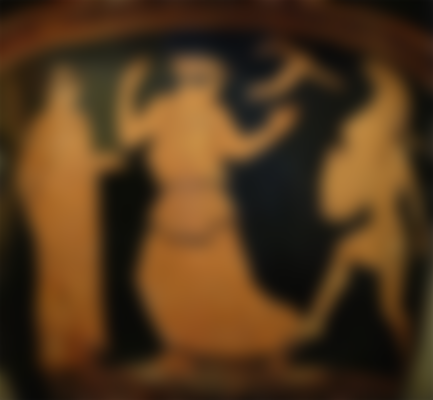The beautiful daughter of Zeus, for whom the Trojan War was fought. The oldest legend does not mention the name of Helen's mother, but only her brothers Castor and Polydeuces, as well as her husband - the Spartan king Menelaus. It was later said that Helena was the daughter of Zeus and Tindare's wife Leda. Zeus approached the Lady the same night as Tyndareus, and transformed him into a swan; with the father of the gods Leda she conceived Helen and Polydeuces, and with Tindareus - Castor and Clytemnestra.
There is also a well-known legend that Helena is the daughter of Zeus and Nemesis; in order to avoid Zeus' embrace, Nemesis fled across the sea and the land, transforming herself into various animals. When she turned into a goose, the father of the gods, in the form of a swan, united with her, in Ramnunt, in Attica. The fruit of their love was an egg, the color of a blue hyacinth, which a shepherd found and handed over to the Lady. From that egg, Helena was born, who was raised by Leda and Tindarej as their child. Helena grew up at the court of Tindareus, and the word about her exceptional beauty, which spread throughout the Greek world, reached Athens, Theseus and his friend Pirito. Although she was not yet ready for marriage, the heroes kidnapped her and fled with her to Attica (picture below). As the Athenians did not want to clash with the Lacedaemonians because of that kidnapping, Theseus took Helena to the Attic town of Afidna and entrusted her to his mother Etri for safekeeping. In Theseus' absence, Helen's brothers - the Dioscuri - invaded Attica with their army and ravaged the country until the Academy or Ehedem revealed to them the place where Theseus had taken the girl. Castor and Polydeuces then razed Afidna to the ground and, after capturing Etra, returned to their homeland with their sister. It was rumored that Helena was already carrying Theseus' child under her breast at that time; on her return to Sparta, she gave birth to a girl, Iphigenia, in Argos, and, as a sign of gratitude for an easy birth, erected a sanctuary for the goddess Eiletia. Helena entrusted her newborn daughter to her sister, Agamemnon's wife Clytemnestra.

After some time, King Tyndareus decided to marry his beautiful daughter. Beggars with rich gifts came from all over Greece; they were all respectable princes, so that Tyndareus could not decide to whom he would give Helen's hand. Odysseus advised the king to swear before all the beggars that he would defend the lucky chosen one from any misfortune, and to leave the choice of husband to Helena. Tyndareus obeyed Odysseus' advice; he sacrificed a horse, and then called on all the heroes to swear in front of the altar that they would protect Helen's future husband. After the beggars took the oath, Tindarej buried the pieces of the sacrificed animal in a place that has since been called the Horse's Tomb. Helena decided to give her hand to Menelaus, who, after Tindareus' death, became king of Sparta.
Helena gave birth to Menelaus' daughter Hermione. Their happiness was short-lived, because the goddess Aphrodite was not in favor of that marriage. One day before Helen's marriage, Tyndareus offered sacrifices to the gods, but forgot about Aphrodite. In order to take revenge on him, the goddess decided that his daughters - Helena, Clytemnestra and Timandra - would become adulteresses. Paris 'verdict (in a dispute between three goddesses - Hera, Athena and Aphrodite) brought misfortune to Menelaus' home and all Greeks. Aphrodite promised Paris the most beautiful wife, and since it was Menelaus' wife Helena, the young Trojan prince, according to the goddess's advice, came to Sparta. Unaware of the evil, Menelaus entertained the newcomer for nine days, then left him with his wife and sailed for Crete to attend the funeral of his grandfather Catreus. In Menelaus 'absence, Paris easily won the love of his beautiful wife, and she, with her husband's treasure and her slave, Theseus' mother Ether, left home and her minor daughter Hermione. The lovers reunited on the island of Cranai, and then Paris' ship, after a long wandering and staying in Sidon, sailed to Troy. The Trojans welcomed Paris and Helen with open arms; everyone was enchanted by the beautiful newcomer, even King Priam. Menelaus and Odysseus later arrived in Troy and demanded that Helen be returned to them, and when the Trojans refused to do so, the Trojan War began.
Helena lived in Troy as Paris' lawful wife during the whole war, but the goddess Irida constantly instilled in her a longing for her homeland, parents and her husband's home. In the last year of the war, when Odysseus entered the city disguised as a beggar, Helena recognized him, but did not betray him. After Paris' death, she remarried Priam's son Deiphobus. Helena soon betrayed the trust of the Trojans and the love of her new husband. That night when Troy was set on fire and destroyed, she gave the agreed torches to the Greek fleet with burning torches, and then she removed Defoe's weapon and allowed Menelaus to kill him. Menelaus gave up his firm intention to take revenge on his unfaithful wife when he saw Helen's beautiful face in front of him again; her loveliness overcame his anger, and the sword of vengeance fell from Menelaus' hands (picture below). Then, the Greek army decided to stone Helena, the culprit of all their sufferings and deaths of numerous heroes. Her beauty won again and the avengers gave up their intention.

Menelaus and Helen's return to their homeland was arduous and lasted eight years. Their ship wandered for a long time in the eastern Mediterranean and the bora finally threw it on the shores of Egypt. With the help of Eidoteja and Proteus, Menelaus and Helena, with rich gifts, left Egypt and, thanks to favorable winds, arrived in Sparta, where they lived in love and harmony until their deaths. It was later said that Helena never arrived in Sparta. Menelaus' ships, full of gold, docked on the shores of Argolis on the same day that Orestes took revenge on Agamemnon's murderers - his mother Clytemnestra and her lover Aegisthus. Menelaus sent Helen to go to Agamemnon's court at night and to find out what had happened in their absence. When Orestes saw Helen in Trojan clothes sitting, surrounded by maids, according to foreign customs, he realized that she was to blame for his misfortunes; with a drawn sword, he flew at her, but at the same moment, on Zeus' order, Apollo wrapped a cloud around Helen and took her to Olympus, where she became immortal.
In Rhodes, it was rumored that Menelaus left behind two illegitimate sons, Nicostratus and Megapentus, who expelled Helen from Sparta. She fled to Rhodes to her friend and compatriot Polyxius, whose husband died in the Trojan War. Polikso welcomed the beautiful Leda's daughter in a friendly way, but she secretly decided to take revenge on her for her husband's death. While Helena was bathing, Polixo changed her maids into Erinyes and sent them to frighten her. When she saw the horrible apparitions, Helena went mad with fear, and the maids then hung her on a tree.
After her death, Helena arrived on the island of Leuca, where she became Achilles' wife. She gave birth to the greatest Greek hero, a son Euphorion, Zeus' pet. Some say that Achilles and Helena met while they were still alive; after landing on Trojan soil, Achilles wanted to see the woman who caused that terrible war. Aphrodite and Thetis immediately fulfilled his wish. During that meeting, which some say happened in a dream, the love between Achilles and Helena began.
There is also a well-known legend according to which Helena did not tarnish the honor of Menelaus and the Greeks. When Paris took Helen from Sparta, the bora tossed his ship to the shores of Egypt. King Proteus of Egypt received the newcomers warmly, but when he discovered the crime that Paris had committed in Menelaus 'home, he expelled him, and kept and guarded Helen and her treasure until Menelaus' arrival. Others say that the goddess Hera, out of hatred for Paris, made a ghost made of air (eidolon), which the Trojan prince married, while Hermes, on Zeus' order, transferred the real Helen to Egypt and handed her over to King Proteus for safekeeping. Helena was safe as long as Proteus was alive. After his death, while the Greeks and Trojans were fighting over the deceptive character made by Hera, Helen was persecuted with love by Proteus' son Theoclimen. After the destruction of Troy, Menelaus arrived in Egypt with Eidolon and met the real Helen. When the couple recognized each other, the deceptive character disappeared, and Menelaus and Helena, with the help of Dioscurus, returned to Sparta.
The legend mentions five of Helen's wives: Theseus, Menelaus, Paris, Deiphobus and Achilles. The oldest legend speaks only of Menelaus and Helen's daughter Hermione, but it was later said that Helen gave birth to all her husbands, except Dephobe. Theseus gave birth to a daughter, Iphigenia, and to Paris - sons Bunik, Korita, Agana and Ideja, as well as a daughter Helena. Finally, on her return from Troy, she gave birth to Menelaus' son Nicostratus, while she gave Achilles, on the Blessed Isles, a son Euphorion.
Helena is revered as a deity in the Peloponnese (Terapna, Sparta) and on the island of Rhodes. Her and Menelaus' tomb was shown in Terapna, and Helen's sanctuary was also located there. Her sanctuary in Sparta is also mentioned, as well as the cult she enjoyed in Rhodes. Helena is probably an ancient Minoan deity of vegetation, akin to Ariadne; in the cult it is associated with Menelaus and the Dioscuri.
The character of the most beautiful woman in the world captured the imagination of all artists. The poet Stesihor (around 600 AD) sang of Helena as a beautiful but unfaithful woman. It is said that the poet lost his sight because of these curses; only when he denied the previous one with a new song and stated: "It is not true that I sang, you did not go on the ships of beautiful oars nor did you come to the Trojan fortress", Stesihor saw again. That chaste heroine is the main character of Euripides' tragedy Helen. Based on the preserved fragments, it can be concluded that Sophocles wrote a tragedy and a satirical play about Helena. In Greek handicrafts, Helena with Paris and her meeting with Menelaus after the conquest of Troy are often depicted on painted vases and mirrors.
Literature:
• Dragoslav Srejović - Aleksandrina Cermanović-Kuzmanović, Recnik grčke i rimske mitologije, drugo izdanje, Beograd: Srpska književna zadruga, 1987


Helen was followed by lust and violence throughout her life, and the fact that she belonged to the greatest of people is not a great consolation to her.